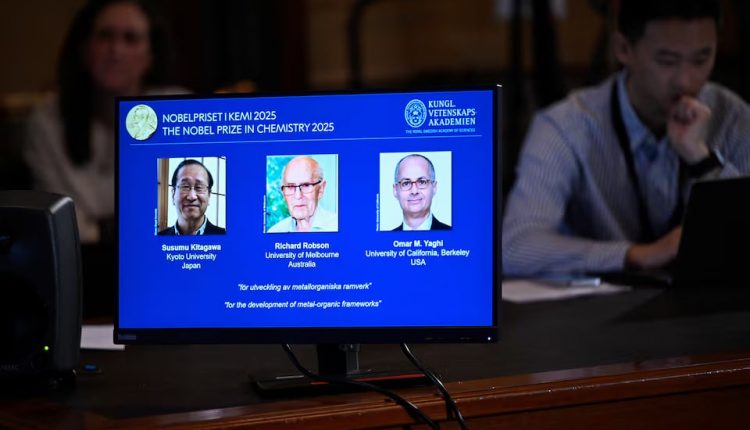Kitagawa, Robson, and Yaghi Win 2025 Nobel Prize in Chemistry for Pioneering Molecular Frameworks
Addis Ababa, October 8, 2025 (FMC) — Scientists Susumu Kitagawa, Richard Robson, and Omar M. Yaghi have been awarded the 2025 Nobel Prize in Chemistry for developing metal-organic frameworks (MOFs), molecular structures capable of storing large amounts of gases and chemicals in tiny volumes, Reuters reported.
The Royal Swedish Academy of Sciences highlighted the materials’ “unheard of properties,” noting that a porous material roughly the size of a sugar cube can have a surface area comparable to a large football pitch. Olof Ramstrom, a member of the Nobel Committee for Chemistry, said: “A small amount of such material can be almost like Hermione’s handbag in Harry Potter. It can store huge amounts of gas in a tiny volume.”
MOFs have wide-ranging applications, including harvesting water from desert air, capturing carbon dioxide, safely storing toxic gases, removing persistent “forever chemicals” (PFAS) from water, and breaking down traces of pharmaceuticals in the environment. Since the discovery, chemists have built tens of thousands of different MOFs with potential solutions to major global challenges.
The laureates are based in Japan, Australia, and the United States. Kitagawa is a professor at Kyoto University, Robson at the University of Melbourne, and Yaghi at the University of California, Berkeley. Kitagawa expressed his vision of capturing and separating air to convert it into useful materials using renewable energy.
Yaghi, born to Palestinian refugees in Jordan, described science as “the greatest equalising force in the world,” reflecting on his journey from a one-room home shared with the family’s livestock to becoming a Nobel laureate.
The winners will share the prize of 11 million Swedish crowns ($1.2 million), continuing the tradition of recognizing pioneering contributions to science. This Chemistry Nobel follows announcements earlier this year for the 2025 Nobel Prizes in medicine and physics, emphasizing the ongoing global importance of scientific innovation.

